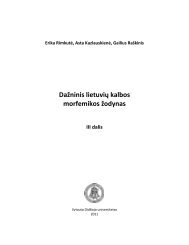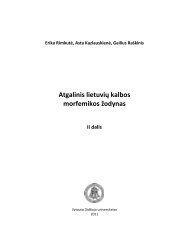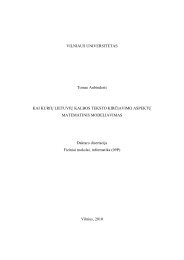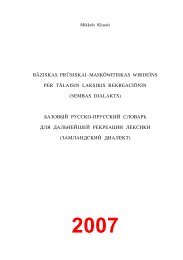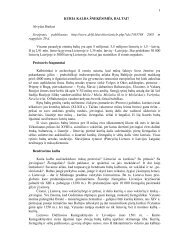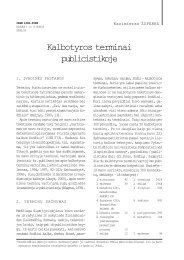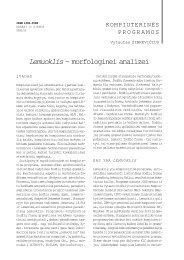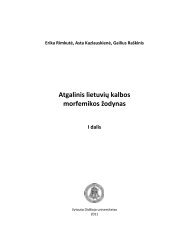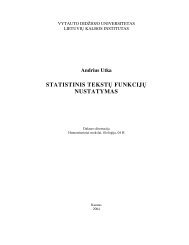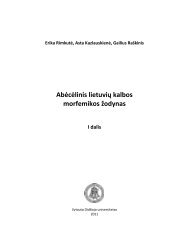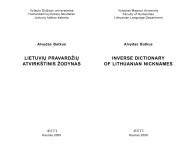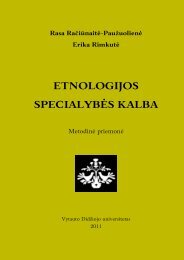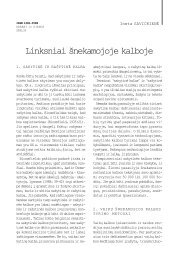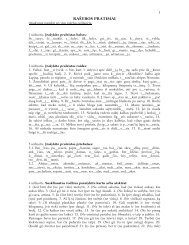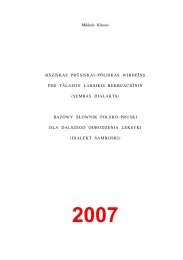HISTORICAL GRAMMAR OF OLD PRUSSIAN
HISTORICAL GRAMMAR OF OLD PRUSSIAN
HISTORICAL GRAMMAR OF OLD PRUSSIAN
You also want an ePaper? Increase the reach of your titles
YUMPU automatically turns print PDFs into web optimized ePapers that Google loves.
<strong>HISTORICAL</strong> <strong>GRAMMAR</strong> <strong>OF</strong> <strong>OLD</strong> <strong>PRUSSIAN</strong><br />
* 10. The articulation of Pr. -a moved forward after palatals and j,<br />
i.e. was spelled as a and e irrespectively, e.g.: Pr. (E) garian = *gar’an<br />
‘tree’ vs. wargien = *var’an ‘copper’ (the spelling wargien with g shows<br />
that the informant perceived *r’ as *rj, cf. PEÞ IV 221 as well as * 24<br />
further), (III) gçide = *g…eid’a ‘waits’. At the same time the unstressed Pr.<br />
a is spelled as e sometimes, e.g. (III): sedinna ‘states’ (PEÞ IV 34 s.v.<br />
sadinna), widdewû ‘widow’ (PEÞ IV 234), (E): tresde ‘thrush’ (PEÞ IV<br />
199), wessis ‘sledge’ (PEÞ IV 232) 10 .<br />
b) Long vowels<br />
* 11. The dialect of the Elbing Vocabulary is more archaic than<br />
dialect(s) of the Catechisms in respect to the fate of Baltic long vowels,<br />
whether accented or unaccented. The fate of the final lond *-ç in the<br />
Prussian word for ‘mother’ is a good example to make this evident. This<br />
word is barytone (the ending is unstressed), but the shortening of the final<br />
vowel took place in dialects of the Catechisms only, cf. (E) mothe = *m¯Étç<br />
(the ending is long!) vs. (III) mûti (the ending is short!) < *mûtî < *m¯Étç<br />
(for these û resp. î see further ** 13, 15).<br />
* 12. Balt. *î --> WBalt. *î produced Pr. (E) *î, spelled as i, y and ie,<br />
e.g. : Pr. (E) giwato ‘life’ (cf. Lith. gyvat‡a), ylo ‘awl’ (cf. Lith. ƒyla, Latv.<br />
µlens ‘idem’), liede ‘pike’ (cf. Lith. lyd…ys, Latv. l±daka). The same WBalt.<br />
*î is spelled as i, î, ei, ey in the Catechisms. Cf. spelling of the same word<br />
final vowels are reduced to short there (this is obvious from the variations in spelling as in gen.<br />
sg. fem. menses II / mensas III < *-`s). Nevertheless this process (known as reduction of the final<br />
vowels) is not attested in the Elbing Vocabulary – cf. antis (not o ants), wosee. This shows that the<br />
inflection nom. sg. masc. -is (with its i reduced) instead of *-as hardly can be explained as a result<br />
of purely phonetic shortening (no shortening took place!). Therefore, the inflection nom. sg.<br />
masc. -s as well in the dialects of the Catechisms may be older than the reduction of the final<br />
vowels there and may have been caused by the same grammatical (not pure phonetic) reasons as<br />
in the dialects of the Elbing Vocabulary (cf. here ** 89, 91–92). – L.P.<br />
10 Spelling a as e reflects the reduction of a in the unstressed position and shows the strength of<br />
the dynamic accent in Prussian. Therefore this was namely the strong accent which caused reduction<br />
of the final (unstressed) vowels in the dialects of the Catechisms. As for mixing a and e after<br />
palatals and j, this reflects the absence of the phonematic opposition between /a/ and /e/ in all<br />
positions except initial – cf. ftn. 8. – L.P.<br />
17



